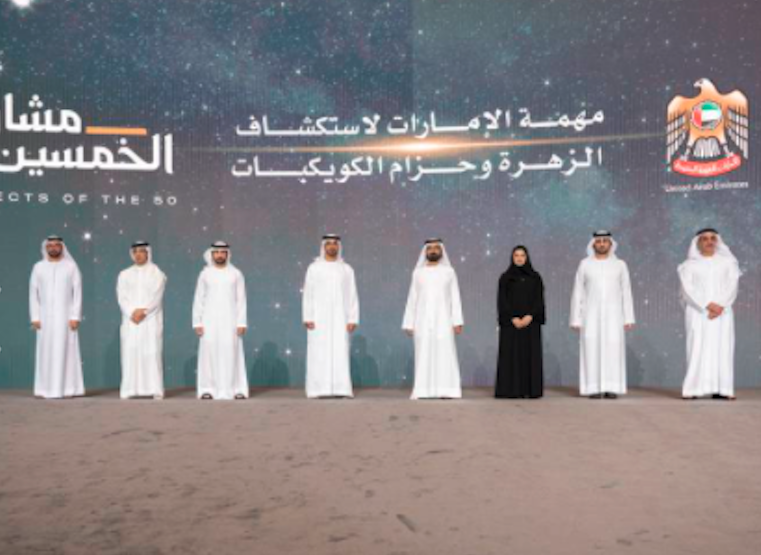Sheikh Mohammed bin Rashid says seven asteroids will also be explored
The UAE’s next space mission will set its sights on Venus, Sheikh Mohammed bin Rashid, Vice President and Ruler of Dubai, has said.
As part of the country’s 50 projects announcement, seven asteroids will also be explored, he said.
The mission is scheduled to launch in 2028, with the primary goal of exploring the asteroid belt between Mars and Jupiter. This is where most meteorites that impact earth are found.
“Today, the UAE launched, among the 50 projects, a new space mission to explore planet Venus and seven other [asteroids] in the solar system,” Sheikh Mohammed wrote on Twitter.
Sheikh Mohamed bin Zayed, Crown Prince of Abu Dhabi and Deputy Supreme Commander of the Armed Forces, said the launch of a new project to explore Venus and the asteroid belt set “an ambitious new goal for our country’s burgeoning space programme”.
“The UAE is determined to make a meaningful contribution to space exploration, scientific research and our understanding of the solar system.”
Sarah Al Amiri, Minister of State for Advanced Sciences and chairwoman of the UAE Space Agency, set out details of the mission in the presence of the ruler of Dubai and the crown prince of Abu Dhabi.
The asteroid belt is 3.6 billion kilometres away. The distance is roughly seven times the length of the Hope probe’s trip to Mars.
The spacecraft, according to a video shared online, will take seven years to build and the launch is scheduled for 2028.
The journey is expected to last five years.
The new Emirati space mission is designed to advance the country’s space engineering, scientific research and exploration capabilities, while also creating more opportunity in the private sector.
“We have set our eyes to the stars because our journey to development and progress has no boundaries, no borders and no limitations,” said Sheikh Mohammed.
“Today we are investing in the generations to come.”
“With each new advancement we make in space, we create opportunities for young people here on Earth.”
Using knowledge and experience gained from the Emirates Mars Mission (EMM), the new mission will be inviting participation from Emirati private sector companies.
Five initiatives are being launched around the new mission by the UAE Space Agency to accelerate the development of the UAE’s space sector:
· A fully funded programme to establish Emirati space sector businesses
· Priority access to contracts and procurement for the mission by Emirati companies
· A vocational training programme to train young Emiratis on component assembly and space subsystems engineering
· A programme to bring local and international universities and research centres together to work on the mission, including Laboratory for Atmospheric and Space Physics (LASP) and Emirates University
“This new mission tests and extends the capabilities of Emirati youth in achieving Zayed’s ambition to explore space,” said the crown prince of Abu Dhabi.
“We are certain that our talented local engineers, academic and research institutions, which have so far made quantum leaps in developing our space sector, are well equipped to take on this daring new challenge.”
On it’s five-year journey, the spacecraft will first orbit Venus, then Earth, building up the velocity to reach the main asteroid belt past Mars.
It will come as close as 109 million kilometres to the Sun and as far as 448 million km, requiring special equipment to deal with both temperature extremes.
“Our goal is clear: to accelerate the development of innovation and knowledge-based enterprises in the Emirates,” said Ms Al Amiri, Chairwoman of the UAE Space Agency.
“This can’t be done by going steady-state, this requires leaps in imagination, in faith and the pursuit of goals that go beyond prudent or methodical.
“When we embarked on the Emirates Mars Mission, we took on a six-year task that was in the order of five times more complex than the Earth observation satellites we were developing.
“This mission is in the order of five times more complex than EMM.”
By the middle of 2028, the spacecraft will make its first planetary approach and orbit Venus.
Around a year later it will closely orbit Earth.
The first fly-by of the main asteroid belt will occur in 2030 when it will observe seven main belt asteroids before landing on one 560 million kilometres from Earth in 2033.
This will make the UAE the fourth country to land a spacecraft on an asteroid.
The exact equipment to be used on the mission is expected to be announced in the middle of next year.
The UAE took its first steps towards space exploration in 1997 when the first communications satellite Thoraya was launched.
Nine years later, the country was building its own satellites, and in 2018 the Mohammed bin Rashid Space Centre launched the first 100 per cent Emirati designed-and-built KhalifaSat.
The Emirates Mars Mission was announced in 2014, the same year that the UAE Space Agency was established. Its Hope Probe aims to build the first detailed picture of the climate on the red planet throughout the Martian year. Hope reached the Martian orbit in February this year.
SOURCE: thenationalnews.com

